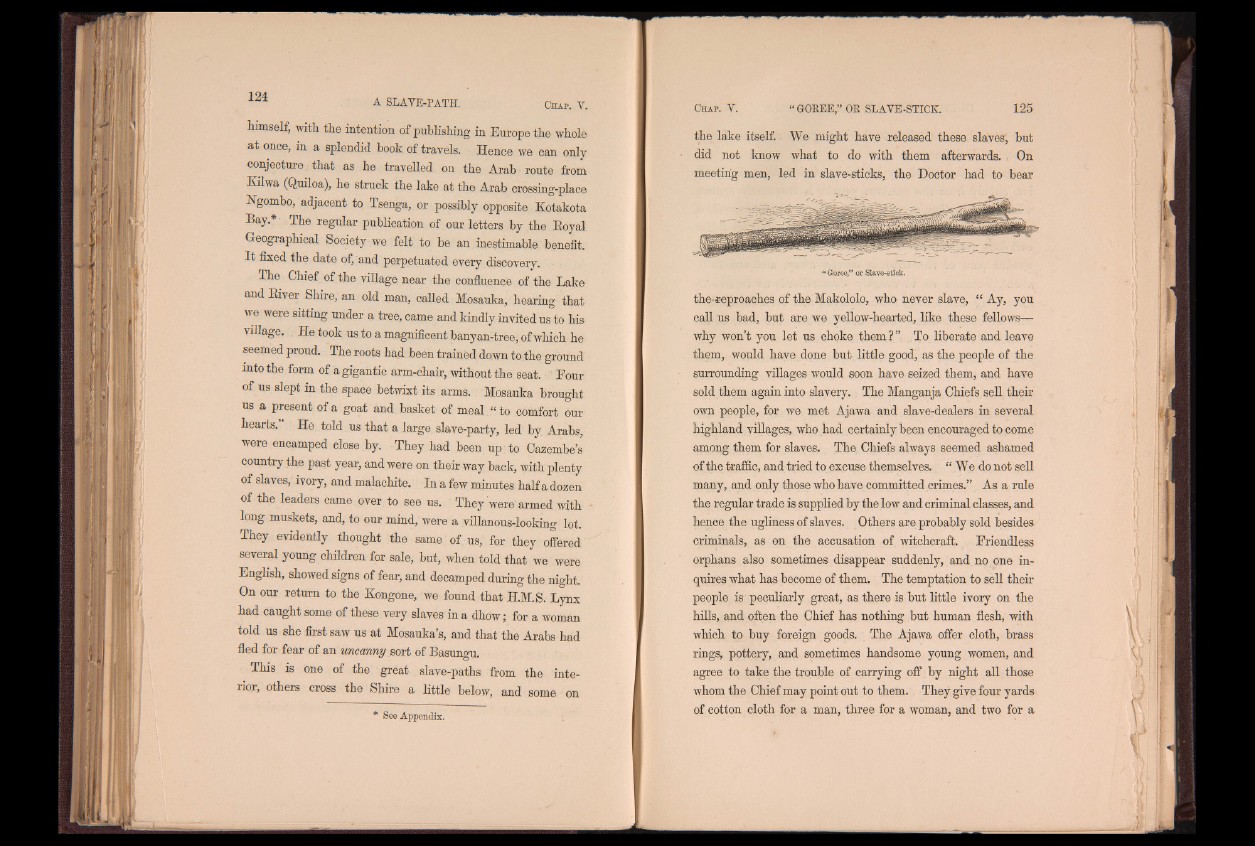
himself, with the intention of publishing in Europe the whole
at once, in a splendid book of travels. Hence we can only
conjecture that as he travelled on the Arab route from
Kilwa (Quiloa), he struck the lake at the Arab crossing-place
Ngombo, adjacent to Tsenga, or possibly opposite Kotakota
Bay * The regular publication of our letters by the Royal
Geographical Society we felt to be an inestimable benefit.
It fixed the date of, and perpetuated every discovery.
The Chief of the village near the confluence of the Lake
and River Shire, an old man, called Mosauka, hearing that
we were sitting under a tree, came and kindly invited us to his
village. He took us to a magnificent banyan-tree, of which he
seemed proud. The roots had been trained down to the ground
into the form of a gigantic arm-chair, without the seat. Four
of us slept in the space betwixt its arms. Mosauka brought
ns a present of a goat and basket of meal " to comfort our
hearts,” He told us that a large, slave-party, led by Arabs,
were encamped close by. They had been up to Cazembe’s
country the past year, and were on their way back, with plenty
of slaves, ivory, and malachite. In a few minutes halfadozen
of the leaders came over to see us. They were armed with
long muskets, and, to our mind, were a villanous-looking lot.
They evidently thought the same of us, for they offered
several young children for sale, but, when told that we were
English, showed signs of fear, and decamped during the night.
On our return to the Kongone, we found that H.M.S. Lynx
had caught some of these very slaves in a dhow; for a woman
told us she first saw us at Mosauka’s, and that the Arabs had
fled for fear of an uncanny sort of Basungu.
This is one of the great slave-paths from the interior/
others cross the Shire a little below, and some on
See Appendix.
the lake itself. We might have released these slaves, but
did not know what to do with them afterwards. On
meeting men, led in slave-sticks, the Doctor had to bear
“ Goree,” or Slave-stick.
the-reproaches of the Makololo, who never slave, “ Ay, you
call us bad, but are we yellow-hearted, like these fellows—
why won’t you let us choke them?” To liberate and leave
them, would have done but little good, as the people of the
surrounding villages would soon have seized them, and have
sold them again into slavery. The Manganja Chiefs sell their
own people, for we met Ajawa and slave-dealers in several
highland villages, who had certainly been encouraged to come
among them for slaves. The Chiefs always seemed ashamed
of the traffic, and tried to excuse themselves. “ We do not sell
many, and only those who have committed crimes.” As a rule
the regular trade is supplied by the low and criminal classes, and
hence the ugliness of slaves. Others are probably sold besides
criminals, as on the accusation of witchcraft. Friendless
orphans also sometimes disappear suddenly, and no one inquires
what has become of them. The temptation to sell their
people is peculiarly great, as there is but little ivory on the
hills, and often the Chief has nothing but human flesh, with
which to buy foreign goods. The Ajawa offer cloth, brass
rings, pottery, and sometimes handsome young women, and
agree to take the trouble of carrying off by night all those
whom the Chief may point out to them. They give four yards
of cotton cloth for a man, three for a woman, and two for a